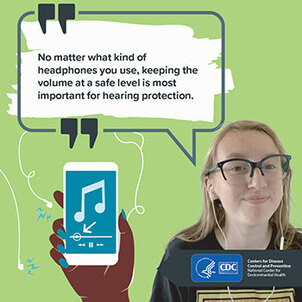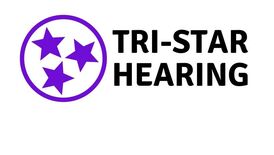 \\Hearing protection is for everyone. There is no cure for hearing loss! The good news? You can prevent hearing loss by protecting your hearing. Avoid loud noise whenever possible and turn down the volume on personal listening devices. If you can’t avoid loud noise, use earplugs or earmuffs to protect your ears. If you suspect you may already have hearing loss, take steps to keep it from getting worse. Get your hearing checked. CDC supports National Protect Your Hearing Month (#NPYHM). It is an annual event each October to provide an opportunity to raise awareness about hearing and speech problems. People are encouraged to think about their own hearing, and to get their hearing checked if they think there might be a problem. Early identification and intervention for hearing loss is important. Many people live with unidentified hearing loss, often failing to realize that they are missing certain sounds and words. Checking one’s hearing would be the first step towards addressing the issue. Do you use your music, your show, or a podcast to shut out the noise around you? Be cautious; hearing loss is real. A volume that lets you hear someone a few feet away is a safer way to go. Did You Know? Repeated exposure to loud noise over the years can damage your hearing—long after exposure has stopped. This is just one of the many informative facts available on CDC’s National Center for Environmental Health’s new hearing loss website. Think you are aware of how to protect yourself? When it comes to hearing loss, we can all think of the usual suspects: attending sporting events, entertainment venues, and loud concerts. Volume isn’t the only factor to consider. Noise exposure is cumulative. Practice safe listening at home, school, and while commuting by reducing the duration of headphone use. Everyday activities can damage hearing. Such as
Browse these pages to discover critical information you are likely unaware of. Useful Info Is the noise too loud? If you need to shout to make yourself heard, yes.
By the Numbers Sound is measured in decibels (dB). A whisper is about 30 dB, normal conversation is about 60 dB, and a motorcycle engine is about 95 dB. Noise above 70 dB over a prolonged period may start to damage your hearing. Loud noise above 120 dB can cause immediate harm. Hearing loss is the third most common chronic health condition in the United States. Almost twice as many people report hearing loss as report diabetes or cancer. In the United States, about 40 million adults aged 20–69 years have noise-induced hearing loss, and about 1 in 4 adults who report “excellent to good” hearing already have hearing damage. Think that hearing damage is usually workplace-related? Activities away from work can damage hearing just as much as a noisy job. Over half of all adults with hearing damage do not have noisy jobs. The average person is born with about 16,000 hair cells within their inner ear. These cells allow your brain to detect sounds. Damaged inner ear cells do not grow back. So, protect your hearing, and if you already have hearing loss, or are experiencing pain, discomfort, or ringing in the ears, take steps to keep it from getting worse. Article from cdc.gov
0 Comments
|
AuthorJamie Martin, NBC-HIS Archives
September 2023
Categories |
Proudly powered by Weebly

 RSS Feed
RSS Feed